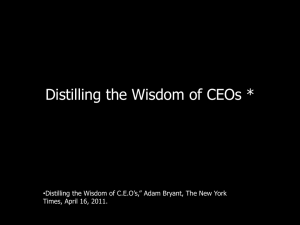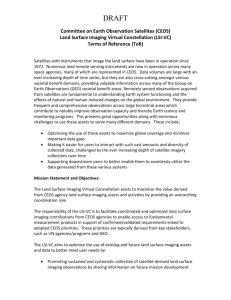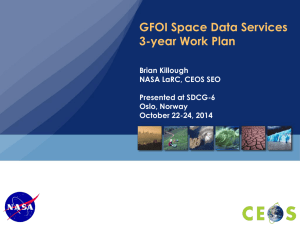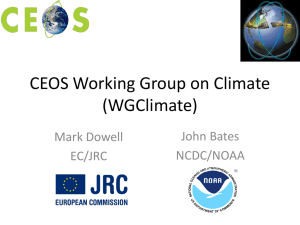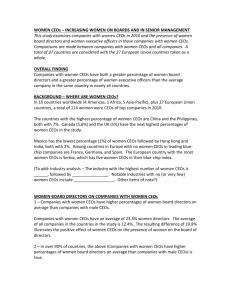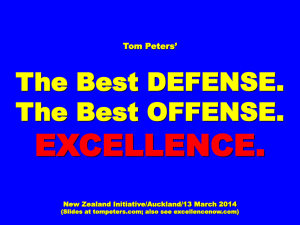CEOS ToR
advertisement
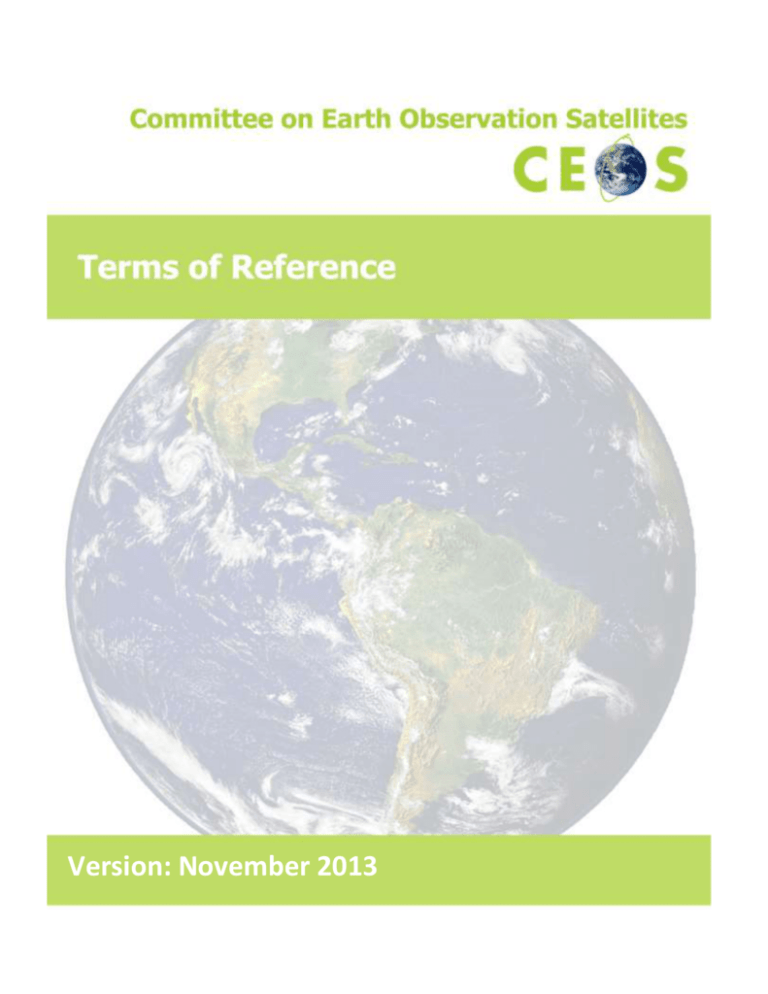
Version: November 2013 FINAL DRAFT - CEOS Terms of Reference – October 25, 2013 Terms of Reference Committee on Earth Observation Satellites (CEOS) Preamble: Remote sensing from space has evolved to a point where distinctions among existing missions result from the technology employed, rather than from the disciplines served in system operations. A number of international and national space-based Earth observation systems currently operate simultaneously and support both interdisciplinary and international activities. The organization of international cooperation in space-based Earth observation systems has also evolved, from mission-specific reviews to the interdisciplinary coordination of multi-mission programs. The Earth observation user community has also expanded to become more complex and diverse, and delivers requirements through numerous coordinating bodies. International discussion and cooperation have enhanced the utility of space-based Earth observation data to users worldwide, encouraged the coordination of program planning among operators of space-based Earth observation systems, and fostered international receptivity to and acceptance of space-based Earth observation system activities and applications. Cooperation in the development and management of remote sensing and associated data management programs benefits operators of space-based Earth observation systems and users of Earth observation data. Redundancy among systems and the utility of data can be optimized through the appropriate coordination of complementary and compatible space and ground segments, data management practices and products, and Earth observation systems research and development. CEOS Members and Associates (as defined below, and collectively referred to as CEOS “Agencies”) have affirmed the value of the activities described above. CEOS Members have agreed to continue to informally coordinate their current and planned systems for Earth observation from space through the organization of a Committee on Earth Observation Satellites (CEOS). Mission: CEOS ensures international coordination of civil space-based Earth observation programs and promotes exchange of data to optimize societal benefit and inform decision making for securing a prosperous and sustainable future for humankind. CEOS has three primary objectives: To optimize the benefits of space-based Earth observation through cooperation of CEOS Agencies in mission planning and in the development of compatible data products, formats, services, applications and policies To aid both CEOS Agencies and the international user community by, among other things, serving as the focal point for international coordination of space-based Earth observation activities, including the Group on Earth Observations and entities related to global change To exchange policy and technical information to encourage complementarity and compatibility among space-based Earth observation systems currently in service or development, and the data received from them, as well as address issues of common interest across the spectrum of Earth observation satellite missions Individual Members of CEOS will use their best efforts to implement CEOS recommendations in their respective Earth observation programs. CEOS will not supersede current or potential 2 FINAL DRAFT - CEOS Terms of Reference – October 25, 2013 agreements by Members. Participation in the activities of CEOS will not be construed as being binding upon space-based Earth observation system operators, or as restricting their right to develop and manage Earth observation systems according to their needs and policies. Organization: CEOS meetings will be organized and chaired by a designated host organization. Participants (Members and Associates) MEMBERS Governmental organizations that are international or national in nature and are responsible for a civil space-based Earth observation program currently operating, or at least in Phase B (detailed design phase) or equivalent of system development, are eligible for membership in CEOS. Members must have a continuing activity in space-based Earth observation intended to operate and provide nondiscriminatory and full access to data that will be made available to the international community. The addition of Members will be with the consensus of current Members of CEOS. Request for membership should be addressed to the Chair of the next scheduled CEOS Plenary session. The Members at that meeting will consider such requests. ASSOCIATES The following may be invited to participate in CEOS as Associates: 1. Governmental organizations that are international or national in nature and currently have a civil space-segment activity in Phase A/pre-Phase A (concept feasibility and definition phase) or equivalent of system development, or a significant ground-segment activity that supports CEOS objectives 2. Other existing satellite coordination groups and scientific or governmental bodies that are international in nature and currently have a significant programmatic activity that supports CEOS objectives Addition of Associates will be by consensus of existing Members. Associates may participate fully in CEOS Plenary and Working Group discussions, and have their views included in reports; however, approval by Associates will not be required to establish consensus. The autonomy of both the associated organizations and the respective national and international Earth observation programs will remain intact. Membership in CEOS does not automatically assume membership in the respective associated organizations. It is the responsibility of each Member and Associate to inform the CEOS Chair of a change in its status with regard to CEOS participant eligibility as outlined in these Terms of Reference. In the event that an organization’s status changes, CEOS Members will review the change. Following the review, a change in status will be by consensus of the CEOS Members at a Plenary meeting. Cooperative Activities CEOS Agencies will exchange technical information on and pursue the potential for coordination of space and ground segments. Such coordination could include discussions on current and future mission parameters, sensor capabilities and intercalibration, and data and telemetry downlink characteristics. In addition, Earth observation systems coordination within CEOS could address issues of ground station technical compatibility for backup satellite tracking, command and control, and sensor and telemetry data reception. 3 FINAL DRAFT - CEOS Terms of Reference – October 25, 2013 CEOS Agencies will investigate the means for increasing data utility and cost effectiveness for both operators and users. CEOS activity could include the coordination of data acquisition, sampling, and preprocessing methodologies; the standardization of data formats where appropriate; the increase in compatibility of data archives; and the enhancement of user access to CEOS Agency data bases, information products, and services. CEOS Agencies will present their plans for emerging satellite remote-sensing technologies and programs, and they will discuss appropriate approaches for the coordination of future systems. CEOS Agencies will address current developments and future direction/opportunities regarding Earth observation from space, including free-flying spacecraft, mission-specific instruments flown on space transportation systems, and the placement of instruments on space platforms. CEOS Agencies will seek to ensure that the user community is made aware of the satellite programs of Members and will encourage discussions between the users and relevant satellite system operators, as necessary. CEOS will consider and may make recommendations and agree on actions to promote appropriate coordination across satellite coordination groups, and national and international satellite programs. Furthermore, CEOS encourages its Members to maintain communication as appropriate with other external groups and organizations involved in space-based Earth observation activities and applications through the relevant channels within their respective governments. These external groups may include, but are not limited to, the Group on Earth Observations (GEO) and Global Earth Observation System of Systems (GEOSS); the United Nations Framework Convention on Climate Change (UNFCCC); the UN International Strategy for Disaster Reduction; the UN Convention on Biological Diversity; the Global Climate, Ocean, and Terrestrial Observing Systems; and the Group of Eight/Group of Twenty (G20) industrialized nations. Planning, Implementation, and Reporting: CEOS will convene once each year in Plenary session. CEOS Plenary meetings will be hosted, organized and chaired by the CEOS Chair. Each Member and Associate will designate a Principal and a Contact for coordination between meetings. Each agency should inform the CEOS Chair and CEOS Executive Officer (CEO) of Principal and Contact changes. At the Plenary meeting of CEOS, the time, place, and host (CEOS Chair) for the next two meetings will be confirmed. Every effort should be made to rotate the CEOS Chair responsibility among major geographic regions (Americas, Europe/Africa, Asia/Pacific) to promote leadership diversity. The incoming CEOS Chair will assume chair responsibilities at the conclusion of the Plenary meeting. Allocation of Plenary actions will be coordinated between the incoming and outgoing Chairs. Additional information regarding the roles and responsibilities of the CEOS Chair can be found in the CEOS Chair Terms of Reference. CEOS includes the following permanent organizational mechanisms, as detailed in the CEOS Governance and Processes document: the Secretariat (SEC), the Strategic Implementation Team (SIT), the CEOS Executive Officer (CEO), the CEOS Systems Engineering Office (SEO), the Working Groups and the Virtual Constellations. Additional information regarding the objectives, roles, and responsibilities of these entities can be found in their respective Terms of Reference. In addition, CEOS utilizes the Troika (prior year, current year, future year CEOS Chairs) to allow CEOS leaders to 4 FINAL DRAFT - CEOS Terms of Reference – October 25, 2013 exchange ideas and discuss important issues regarding current year achievements, and direction, strategy, plans, and expectations for the following year. The Troika is chaired by the CEOS Chair. The CEO and SIT Chair are regularly invited to attend and others may be invited at the discretion of the CEOS Chair. In addition to the permanent mechanisms noted above, CEOS may establish, as mutually agreed and on an ad hoc basis, temporary mechanisms (hereafter known as Ad Hoc Teams) to investigate specific areas of interest, cooperation and coordination and to report at subsequent Plenary meetings. Continuation of each Ad Hoc Team requires confirmation at each Plenary session. Conclusions resulting from CEOS Plenary sessions or the findings and recommendations of Ad Hoc Teams will be acted upon at the discretion of each CEOS Member. Amendment History Adopted 9/25/1984: Amended 11/11/1986: Amended 4/5/1989: Amended 11/14/1990: Reconfirmed 12/10/1991: Amended 12/11/1992: Amended 11/18/1993: Amended 10/10/1996: Amended 11/12/1998: Amended 11/09/2000: Amended 11/15/2005: Amended 11/6/2013: 1st CEOS Plenary, Washington, D.C., USA (Host: NOAA) 2nd CEOS Plenary, Frascati, Italy (Host: ESA) 3rd CEOS Plenary, Ottawa, Canada (Host: CSA) 4th CEOS Plenary, São José dos Campos, Brazil (Host: INPE) 5th CEOS Plenary, Washington, D.C., USA (Host: NASA/NOAA) 6th CEOS Plenary, London, United Kingdom (Host: BNSC) 7th CEOS Plenary, Tsukuba, Japan (Host: MEXT/NASDA) 10th CEOS Plenary, Canberra, Australia (Host: CSIRO) 12th CEOS Plenary, Bangalore, India (Host: ISRO) 14th CEOS Plenary, Rio de Janeiro, Brazil (Host: INPE) 19th CEOS Plenary, London, United Kingdom (Host: BNSC) 27th CEOS Plenary, Montreal, Canada (Host: CSA) NOTE: A detailed description of the amendments can be found in the CEOS_Historical_Record document on the CEOS website (www.ceos.org) under the “Governing Documents” menu link. These CEOS Terms of Reference can be amended or modified only after review and careful consideration by the CEOS Agencies. This review should also examine other CEOS guiding documents that will be affected by the amendment or modification to ensure that all of the guiding documents are consistent and mutually supporting. The specific amendments or modifications must be reviewed at a CEOS SIT Meeting and approved at the subsequent CEOS Plenary. 5
